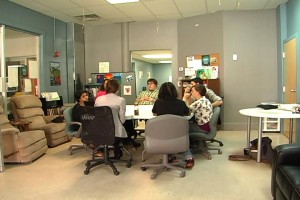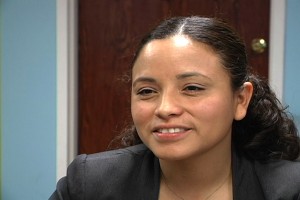 The half dozen young people gathered at a community center in Woonsocket got something last month that many never had when going through school: a financial coaching session.
The half dozen young people gathered at a community center in Woonsocket got something last month that many never had when going through school: a financial coaching session.
Leading them step-by-step is Rachel Wall, Director of Coaching for The Capital Good Fund in Providence, a non-profit organization that over the past six years has helped hundreds of people facing financial challenges avoid predatory lenders, while teaching them about good budgeting, health issues and money management.
“Broadly speaking, we use financial services as the tool to uplift the poor,” said Andy Posner, who founded the Capital Good Fund in 2009 as an outgrowth of a master’s degree he was completing at Brown University. It has evolved into a social change organization that uses financial services to help tackle poverty, and has grown to a staff of 15 to run the various programs.
 “There isn’t anything that doesn’t have a financial component,” Posner said. “So we think it’s a really important tool that allows you to get at the core issues a person is facing.”
“There isn’t anything that doesn’t have a financial component,” Posner said. “So we think it’s a really important tool that allows you to get at the core issues a person is facing.”
Posner says the fund’s main mission when he founded it was to be an alternative to the so-called payday lenders, which you can find in easily-accessible storefronts throughout Rhode Island. State law allows them to charge up to 261% in interest. “The people they target are ignored by mainstream financial service providers like banks, and they get too much attention from the predatory guys.”
So who uses the Capital Good Fund? Posner said a typical borrower might be a woman trying to get out of an abusive relationship and attempting to move from a shelter to an apartment. She’s got a good job, but not enough money to put down a security deposit. So the fund can help bridge that gap without getting her into more financial trouble.
The fund issues personal loans for $2,000 or less. It has made more than 800 loans totaling more than $700,000, and has also had more than 700 people complete the financial coaching sessions. Borrowers pay 30% interest with a 4% closing fee, which Posner acknowledges may sound high to an average borrower, but is an attractive alternative to the payday lenders.
“The payday loan model only works if you’re caught in a cycle of debt,” he said. “So the average person rolls over their payday loan eight times. That’s how they keep racking up the fees, and it turns into this nightmare cycle of debt. For us, a budget or a debt management plan is just a tool to get at a broader issue. And that’s what makes us really unique. So for instance, if someone comes to us, before we even talk about a budget, we talk about their life, because oftentimes what is driving the budget is domestic violence, hypertension, depression, all sorts of things like that. So we actually use it as a way to get at what’s really happening in someone’s life.’’
And the vetting process is rigorous. Posner says only about half of those who apply are approved for loans, which may account for the 91.5% repayment rate.
 Ana Marcia has taken out three separate loans from the Capital Good Fund over the past three years — all repaid. Two were to help her launch and then expand a Mary Kay business. “This loan opened up a lot of opportunities for me in my business. In fact, I tripled my sales thanks to the loan,” she said.
Ana Marcia has taken out three separate loans from the Capital Good Fund over the past three years — all repaid. Two were to help her launch and then expand a Mary Kay business. “This loan opened up a lot of opportunities for me in my business. In fact, I tripled my sales thanks to the loan,” she said.
Posner says the Good Fund is expanding into auto loans beginning July 1, with a maximum limit of $13,500 and rates ranging from 9% to 15%.
Andy Posner: And this is an economic development issue. People who don’t have reliable transportation either can’t get jobs or can’t keep their jobs, so there’s a huge need. This is a predatory industry that we want to put out of business, and it’s a loan that we’re going to make a lot more money on.
Posner would like to see the Capital Good Fund expand to other states in an effort to move toward sustainability. Right now, interest and fees cover only about a quarter of operating costs. The rest comes from donations and grants.
But to do that, Posner says the fund needs to issue loans on a much larger scale. “We want to be a threat. Success for us would be putting them out of business or forcing them to lower their rates.”
If you want to see the video version of this story go to RhodeIslandSpotlight.org. If you know of a person or organization who you think deserves the Spotlight, send an email to jim@RhodeIslandSpotlight.org.